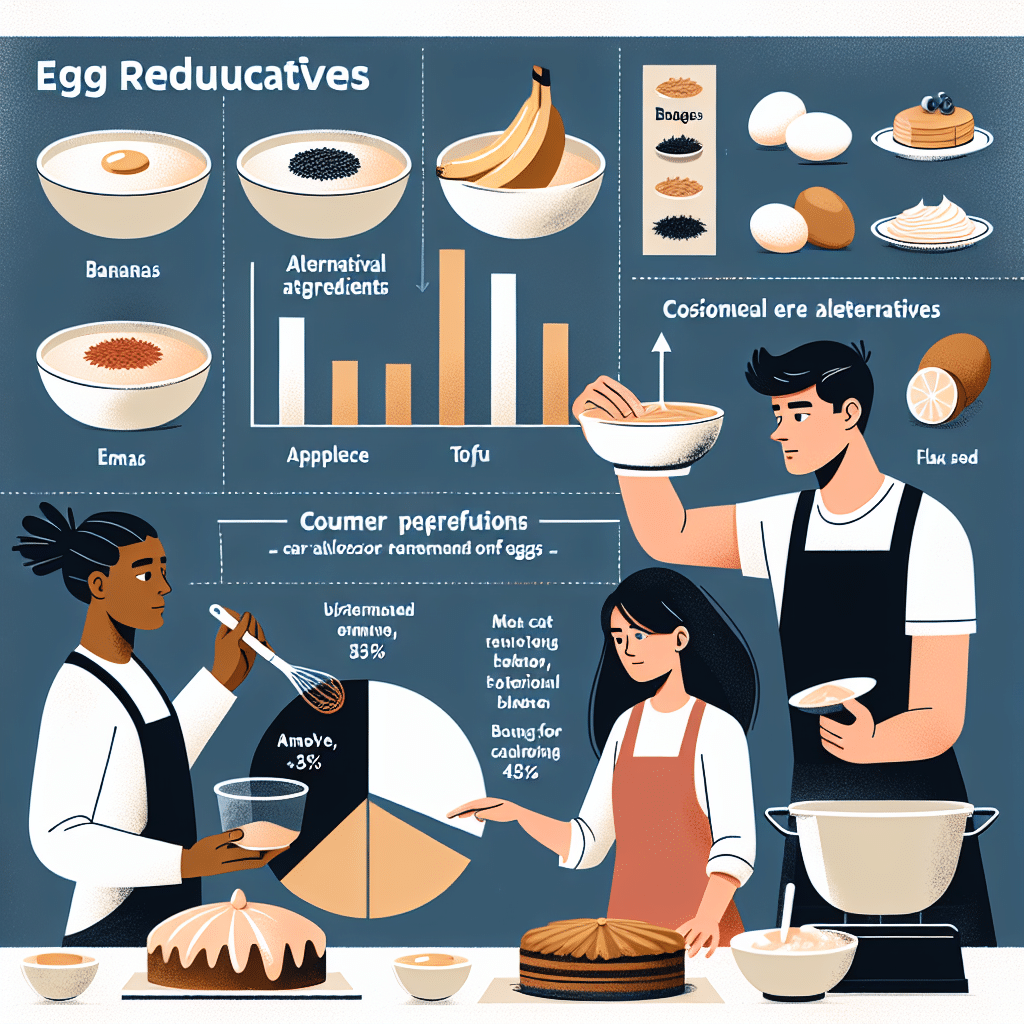Egg Reduction Strategies: Challenges in the Bakery Sector
-
Table of Contents
- Egg Reduction Strategies in the Bakery Sector: Navigating Challenges
- Understanding the Role of Eggs in Baking
- Challenges in Egg Reduction
- Strategies for Egg Reduction
- Egg Substitute Ingredients
- Case Studies and Examples
- Statistics and Market Trends
- Conclusion: Key Takeaways
- ETChem’s Protein Products for the Bakery Sector
Egg Reduction Strategies in the Bakery Sector: Navigating Challenges

The bakery industry is a dynamic and ever-evolving sector that continually adapts to consumer demands, dietary trends, and economic pressures. One of the significant challenges faced by the sector is the need to reduce or eliminate eggs from baked goods. This necessity arises from various factors, including the rising cost of eggs, health concerns, ethical considerations regarding animal welfare, and the increasing demand for vegan and allergy-friendly products. In this article, we will explore the challenges associated with egg reduction strategies in the bakery sector and how businesses are overcoming them.
Understanding the Role of Eggs in Baking
Eggs play a crucial role in baking, providing structure, leavening, moisture, and flavor to a wide range of products. They contribute to the texture and stability of cakes, cookies, bread, and pastries. However, replacing eggs in baking is not a straightforward task, as they perform multiple functions that must be replicated by alternative ingredients.
Challenges in Egg Reduction
Reducing or eliminating eggs from baked goods presents several challenges:
- Functional Equivalency: Finding substitutes that can mimic the multifunctional properties of eggs is difficult.
- Cost-Effectiveness: Alternative ingredients must be economically viable to avoid significant price increases.
- Consumer Acceptance: The taste, texture, and appearance of egg-free products must meet consumer expectations.
- Supply Chain: Sourcing reliable and consistent supplies of alternative ingredients can be challenging.
- Regulatory Compliance: Egg substitutes must comply with food safety and labeling regulations.
Strategies for Egg Reduction
Bakeries have adopted various strategies to reduce egg content in their products:
- Partial Egg Replacement: Using a combination of eggs and substitutes to maintain quality while reducing egg content.
- Formulation Reengineering: Completely reformulating recipes to exclude eggs and incorporate plant-based proteins and starches.
- Process Optimization: Adjusting baking times and temperatures to accommodate egg substitutes.
- Consumer Education: Informing customers about the benefits of egg-free products to encourage acceptance.
Egg Substitute Ingredients
Several ingredients have been used as egg substitutes in baking:
- Plant Proteins: Soy, pea, and other plant proteins can provide structure and moisture.
- Starches and Gums: Ingredients like cornstarch, xanthan gum, and guar gum can help with thickening and binding.
- Fruit Purees: Applesauce and banana puree can add moisture and act as a binder.
- Leavening Agents: Baking soda and vinegar can be used to provide leavening.
- Dairy Alternatives: Dairy-free milk and yogurt can contribute moisture and richness.
Case Studies and Examples
Several bakeries have successfully implemented egg reduction strategies:
- A large-scale bakery replaced half of the eggs in their cake recipes with a blend of soy protein and starch, resulting in a 25% cost reduction.
- An artisanal bakery developed a line of vegan pastries using flaxseed meal and water as an egg substitute, gaining a loyal customer base.
Statistics and Market Trends
The demand for egg-free bakery products is on the rise, with market research indicating:
- A significant increase in the sales of vegan baked goods over the past five years.
- Consumer surveys showing a growing preference for plant-based and allergy-friendly options.
Conclusion: Key Takeaways
In conclusion, while the challenges of reducing egg content in baked goods are significant, the bakery sector has demonstrated resilience and innovation in addressing them. By leveraging alternative ingredients, optimizing processes, and educating consumers, bakeries can meet the demand for egg-free products without compromising on quality or taste. The key takeaways from this article are the importance of functional equivalency, cost-effectiveness, consumer acceptance, supply chain management, and regulatory compliance in developing successful egg reduction strategies.
ETChem’s Protein Products for the Bakery Sector
For bakeries looking to implement egg reduction strategies, ETChem’s protein products offer a viable solution. Their range of high-quality collagens, including marine, fish, bovine, and chicken collagen, can serve as excellent alternatives to eggs, providing the necessary structure and texture to baked goods. ETChem’s products are characterized by their neutral taste and instant solubility, making them ideal for a variety of applications in the bakery sector. With a commitment to quality and customer satisfaction, ETChem is a trusted partner for bakeries seeking to innovate and adapt to changing market demands.
About ETChem:
ETChem, a reputable Chinese Collagen factory manufacturer and supplier, is renowned for producing, stocking, exporting, and delivering the highest quality collagens. They include marine collagen, fish collagen, bovine collagen, chicken collagen, type I collagen, type II collagen and type III collagen etc. Their offerings, characterized by a neutral taste, instant solubility attributes, cater to a diverse range of industries. They serve nutraceutical, pharmaceutical, cosmeceutical, veterinary, as well as food and beverage finished product distributors, traders, and manufacturers across Europe, USA, Canada, Australia, Thailand, Japan, Korea, Brazil, and Chile, among others.
ETChem specialization includes exporting and delivering tailor-made collagen powder and finished collagen nutritional supplements. Their extensive product range covers sectors like Food and Beverage, Sports Nutrition, Weight Management, Dietary Supplements, Health and Wellness Products, ensuring comprehensive solutions to meet all your protein needs.
As a trusted company by leading global food and beverage brands and Fortune 500 companies, ETChem reinforces China’s reputation in the global arena. For more information or to sample their products, please contact them and email karen(at)et-chem.com today.




